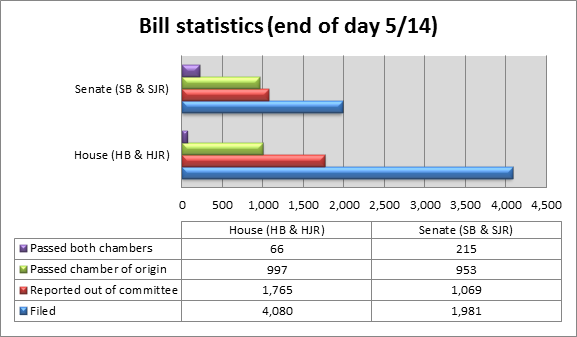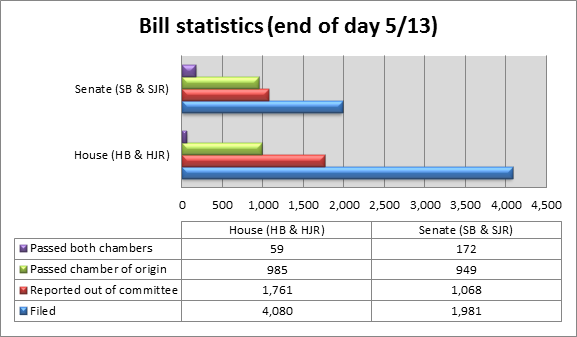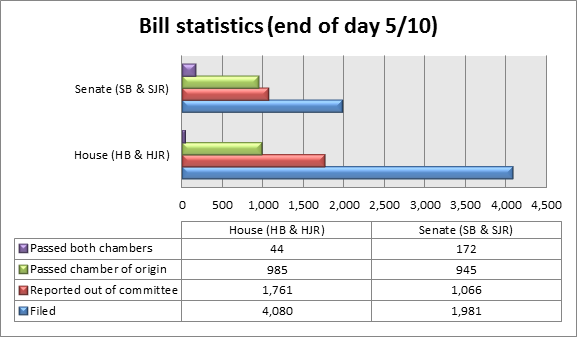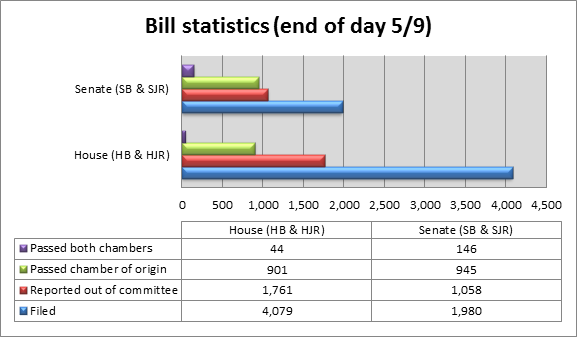



Bill Statistics, May 9, 2013
May 10

|
|
Filed
|
Reported out of committee
|
Passed by chamber of origin
|
Passed both chambers
|
Signed by the Governor
|
|
House Bills & Joint Resolutions
|
4,079
|
1,757
|
669
|
15
|
2
|
|
Senate Bills & Joint Resolutions
|
1,980
|
1,048
|
911
|
107
|
8
|
|
Bills & Joint Resolutions
|
82nd Regular Session
(Nov. 8, 2010-Feb. 24, 2011)
|
83rd Regular Session
(Nov. 12, 2012-Feb. 21, 2013)*
|
% change |
| House filed | 1,886 | 1,673 | -11.29% |
| Senate filed | 940 | 720 | -23.40% |
| Total filed | 2,826 | 2,393 | -15.32% |
| House referred to committee | 970 | 1,188 | 22.47% |
| Senate referred to committee | 745 | 588 | -21.07% |
| Total referred to committee | 1,715 | 1,776 | 3.56% |
| House scheduled for hearing | 19 | 78 | 310.5% |
| Senate scheduled for hearing | 34 | 109 | 220.59% |
| Total scheduled for hearing | 53 | 187 | 252.83% |
| House reported out of committee** | 7 | 1 | -85.71% |
| Senate reported out of committee | 16 | 33 | 106.25% |
| Total reported out of committee | 23 | 34 | 47.83% |
Speaker of the House Joe Straus has released his interim charges to House standing committees, and Lieutenant Governor David Dewhurst has released select interim charges relating to drought and wildfire preparedness to Senate standing committees. The complete text of these charges, as well as information about legislative committees, can be found in the Legislative Reference Library's legislative reports database. In the "Search committee charges" section, choose "82nd" as the legislature and click "search" to a see a complete list of charges that have been issued for the 82nd Legislature. This list will be updated as additional charges are released. If you'd prefer to see only charges relating to a specific topic or committee, try filling in the "subject" or "charge text" boxes to get a list tailored to your needs.
You can also use the legislative reports database to search for committees and full-text interim committee reports all the way back to the 1st Legislature, or you can view a complete list of committees by session. If you're not sure which committee you need, check out the committee search page. Finally, our new committee minutes database contains the full text of minutes from House and joint committees from the 63rd through 74th Legislatures (1973-1995). Senate minutes for those years are currently being scanned and will be added as completed.
State Budget Timeline
Sep 21
The library has just released an interactive Texas state budget timeline. Using information from the drafting of the 2012-2013 biennial budget, this comprehensive guide presents a month-by-month overview of the budget process. The timeline begins in May 2010 with the Legislative Budget Board's instructions for agency appropriations requests and ends in December 2011 with the state comptroller's Annual Cash Report. Budget bills and related documents are mentioned within the timeline and are linked as they are released. The library will update the timeline when the 2013-2014 budget process gets underway, so be sure to check back.

